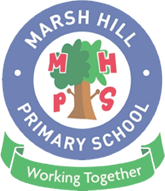History
Intent
The History curriculum at Marsh Hill aims to provide children with a coherent understanding of Britain’s past and that of the wider world. Our aims are to fulfil the requirements of the National Curriculum for history; providing a broad, balanced and differentiated curriculum; ensuring the progressive development of historical concepts, knowledge and skills; and for the children to develop a love for history. Furthermore, we aim to inspire in pupils a curiosity and fascination about history that will lead to pupils leaving Marsh Hill wanting to know more. Pupils in EYFS work towards being an "Exceptional Explorer" through planned adult led activities and child initiated activties in the continuous provision.
The aims of teaching history in our school are:
- to inspire pupils’ curiosity to discover more about the past and to develop an understanding that enables them to enjoy all that history has to offer;
- to enable children to know about significant events in British history and to appreciate how things have changed over time;
- to develop a good sense of chronology;
- to have some knowledge and understanding of historical development in the wider world;
- to help children understand society and their place within it, so that they develop a sense of their own cultural heritage;
- to develop in children the skills of enquiry, investigation, analysis, evaluation, debate, interpretation, problem solving and presentation.
We aim to provide a curriculum that is meaningful and engages our children. To teach history effectively, we look to teach and implement key skills throughout a broad range of topics. We aim to equip children with skills, vital knowledge and deep understanding that they need as they develop their own historical perceptions.
Implementation
History at Marsh Hill is taught in half-termly blocks throughout the year, so that children can achieve depth in their learning. We have moved away from a topic-based approach, however, genuine connections between subjects and topics will be integrated throughout. The key knowledge and skills that children acquire and develop throughout each block have been mapped to ensure progression between year groups throughout the school. At the beginning of each new history topic, teachers refer to timelines to develop children’s understanding of chronology. Each topic is introduced with reference to the chronology of previous topics when appropriate.
The history curriculum at Marsh Hill Primary School is based upon the 2014 Primary National Curriculum in England, which provides a broad framework and outlines the knowledge and skills and taught in each Key Stage. Teachers plan lessons for their class using our progression of knowledge and skills document. Teachers have identified the key knowledge and skills of each half termly topic and theses are mapped across the school, ensuring that knowledge builds progressively and that children develop skills systematically.
This progression document ensures the curriculum is covered and the skills/knowledge taught is progressive from year group to year group. Existing knowledge is checked at the beginning of each topic, as part of the KWL strategy (What I know, What I would like to Know and What I have Learned). This ensures that teaching is informed by the children’s starting points and encourages our pupils to be reflective learners. At the end of each topic, key knowledge is reviewed by the children and consolidated as necessary. Teachers aim to provide appropriate challenge to all learners, in line with our school’s commitment to inclusion.
Impact
Outcomes in history books evidence a broad and balanced curriculum and demonstrate children’s acquisition of identified key knowledge relating to each of the identified national curriculum strands, as appropriate to key stage. By the end of each key stage, pupils are expected to know, apply and understand the matters, skills and processes specified in the relevant programme of study. We aim to encourage learners to ask insightful questions, think critically, examine evidence, scrutinise arguments and present their opinions by developing viewpoint and judgement. At Marsh Hill, we use summative assessment to determine children’s understanding and inform teachers' planning. This is reviewed on a termly basis by the Subject Leader who also carries out regular learning walks, book scrutinies and lesson observations.
We measure the impact of our curriculum through the following methods:
- Children are assessed according to their Key Stage National Curriculum requirements based on their progression in skills and knowledge.
- Teachers use ongoing assessment to identify where children require additional support or challenge.
- Pupils are encouraged to discuss their learning often and this is then used to inform planning going forward. (pupil voice).
- The moderation of pupil’s books happens regularly and there is the opportunity for a dialogue between teachers and subject leaders in order to provide high quality teaching.
- Images and videos of the children’s practical learning are used as evidence towards key skills.
- Annual analysis of children’s progress across the year is carried out by the subject leader.
Documents
History Progression of Skills for EYFS to Year 6
History and Geography Overview for Year 1
History and Geography Overview for Year 2
History and Geography Overview for Year 3
History and Geography Overview for Year 4
History and Geography Overview for Year 5
History and Geography Overview for Year 6

